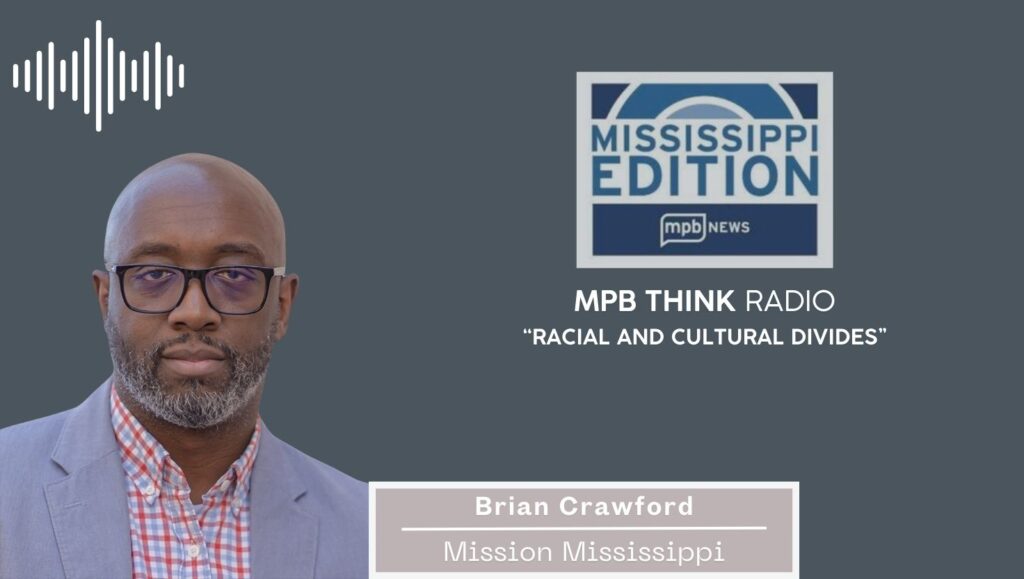Mississippi Edition on MPB Think Radio
Host: Desiree Frazier
Download and listen to the audio interview.
Desiree Frazier: This is Mississippi edition on MPB Think Radio. I’m Desiree Frazier. The political and cultural divide can seem deeper than ever, and a new report from the Mississippi TRHT Alliance is looking at how to bridge those gaps and foster open dialog in communities. The Mississippi Truth, Racial Healing, and Transformation Alliance (TRHT) is a branch of the Foundation for the Mid South, a nonprofit aimed at better understanding and improving race relations in the South.
Brian Crawford is president of Mission Mississippi, a partner organization that helped with the report, speaks with our Shamira Muhammad.
Shamira Muhammad: What does racial healing look like to you?
Brian Crawford: Racial healing, ultimately, looks like collective communities being able to come together—not only to share space, which is important but also to share stories in the most authentic and vulnerable way. By sharing authentic stories, we hope to cultivate shared courage, a shared struggle, and a shared burden. This is where we begin to take on the struggles of people who don’t look, think, or act like us—and vice versa. Others begin to take on our struggles, burdens, and concerns.
In those shared struggles, we find a path to shared successes.
In the past, when people discussed racial healing, they often focused on creating shared spaces.
And while being included in the same spaces is progress, it’s not the end goal. Even when we create opportunities to share space, there’s still the challenge of sharing stories, knowledge, and burdens authentically. Shared space doesn’t guarantee those things.
We believe we must labor and strive to reach a point where we can experience shared success—success that stems from shared struggles and shared stories.
Shamira Muhammad: What inequities do you believe persist in Mississippi, particularly since the founding of your organization?
Brian Crawford: As it relates to Mission Mississippi, we’ve been engaged in the work of racial healing for the past 30 years. Currently, we’re in a collaborative effort with the Foundation for the Mid South, along with six partner organizations.
Through our work, we’ve found that Mississippi communities still recognize the persistence of racial inequities in housing, education, and employment.
For example, during our “One Community Conversations”—a series of dialogues we hosted across southern Mississippi—Mission Mississippi facilitated meetings in Biloxi, Picayune, and Hattiesburg. We learned that many community members perceive inequities in these key areas.
But it’s not just the physical aspects of housing or education; it’s also about access—access to knowledge, insight, and resources that can lead to flourishing.
In other words, it’s about access to information that creates better housing opportunities, more educational resources, and stronger employment opportunities. These were recurring themes we heard in our conversations this summer.
Shamira Muhammad: Forty-seven percent of participants acknowledged the persistence of racial inequities. Were there any findings that surprised you?
Brian Crawford: One of the biggest surprises for us at Mission Mississippi was the variance between communities.
For instance, in Biloxi, one of the major challenges voiced was mistrust in local leadership. But in Hattiesburg, the predominant issue wasn’t mistrust in leadership; it was access.
When we went a bit further to Picayune, we heard something else entirely—distrust among community members themselves.
This highlighted an important lesson: the work of racial healing is not “one size fits all.” It requires being deeply enmeshed in the community—listening to its unique voices and understanding its specific needs.
With our “One Community Conversations,” one of our goals was to broaden the narrative of race by including as many voices and backgrounds as possible. We worked to create spaces where everyone had the chance to speak and share their stories.


